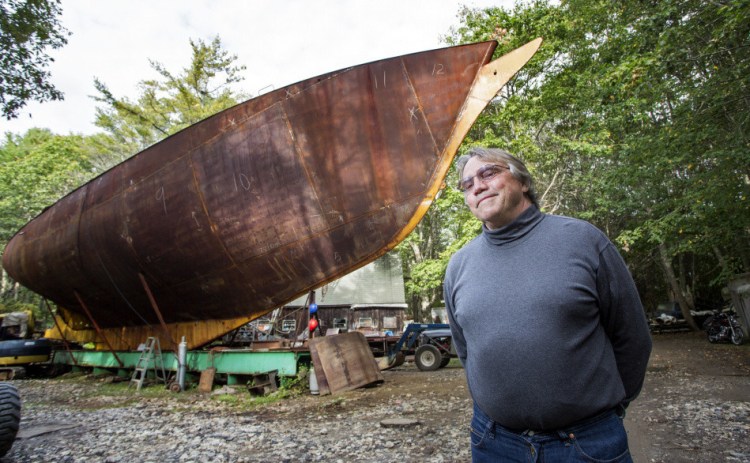FREEPORT — It’s been more than 20 years since Harold Arndt started working on the Island Rover, a 90-foot schooner he dreamed of building out of recycled metal on property he owned in a quiet residential neighborhood off Flying Point Road.
Although the Island Rover Foundation, the nonprofit that’s now behind the project, hopes to launch the ship within a year and use it as a floating classroom, time may have run out for Arndt’s dream.
Last month, Freeport seized control of the boat and the Maquoit Drive property it is being built on after the group missed a court-ordered deadline to move the vessel. The September deadline was part of a 2014 settlement agreement between the town and the Island Rover Foundation to deal with zoning violations at the property that go back more than a decade.
Now, the Town Council has to decide whether it will give the foundation more time to finish and move the boat or find another way to get it off the property, including selling it for scrap. Councilors are expected to discuss and possibly vote on the matter at their meeting starting at 6:30 p.m. Tuesday at the Freeport Community Center.
“The one thing they had to fulfill was to move the boat, and it is unfortunate that was not done,” said Council Chairwoman Melanie Sachs. Considering the foundation’s long history of missed deadlines and unfulfilled promises, she wants proof it will be completed before agreeing to another extension.
“I have conveyed personally to the board members that what I will need to see to entertain any request for extension is a firm timeline and budget,” she said.

Harold Arndt stands below deck in 2012 and talks about the schooner he’s building out of scrap metal in a Freeport neighborhood. His project has a long history of zoning violations.
In a memo to councilors, Town Manager Peter Joseph said getting a court order to extend the 2014 consent agreement isn’t practical. The town could, however, make a new agreement with the foundation that includes conditions such as a time frame and automatic removal of the boat if it isn’t launched by a new deadline, Joseph said. Such an agreement also could alleviate concerns that the town, as owner of the boat and property, might be held liable in case of an accident. The town also could require the foundation to remove the construction clutter and vehicles that litter the wooded property as a condition of transferring it back to the foundation, Joseph said.
Otherwise, the town might either contract with a scrap metal company to remove the boat or get another private company to buy the boat and move it to an appropriate location.
The town does not intend to spend any public money to remove the boat, or to keep the boat or the property, Joseph said in an interview Monday.
Meanwhile, there has been a shakeup in the leadership of the foundation, and Treasurer Ken Koehler said the group is committed to completing and launching the ship within the next season.
In an interview at the work site Monday, Koehler pointed out where the few remaining curved plates need to be welded to the stern of the massive boat. Then it needs to be sandblasted and painted before it can be set afloat, Koehler said. The schooner is built with recycled metal from Bath Iron Works and will be fueled with vegetable oil, he said. It will launch without a motor, propeller and other parts. Those will be installed at a shipyard after the Island Rover is in the water, Koehler said.
Moving the huge boat will be a challenge, he admits. The foundation already has marked large trees that will need to be taken out to get the boat down a small dirt road, and it will have to get past at least one power line.
Then there is the question of where the boat will be launched. One of the foundation’s donors has purchased land on Shore Drive, about a half-mile from the building site, and has applied to the Army Corps of Engineers to build a launch ramp for the vessel. But there is local opposition to the plan and there is no guarantee it will get federal and state approval, Koehler said.
The $100,000 price to move the boat even just to the planned ramp is another hurdle. Koehler believes the foundation can raise the money to move it, but having to go any further could be a stretch.
Underneath it all is Arndt’s long history of town zoning violations. From the town’s perspective, the Island Rover property violates zoning rules that prohibit both marine activities and manufacturing in the residential area.
In 2005, the foundation agreed to a five-year consent agreement to finish the project. It received a three-year extension in 2010, then in 2014 the town sued to enforce its zoning rules, leading to the consent agreement requiring the foundation to move the boat by September.
Koehler said he understands the town’s frustration and the feeling of some neighbors, who have tired of the project after so many missed deadlines.
“I understand, Harold made a lot of promises,” Koehler said. The foundation’s new board members have moved Arndt to the side in an effort to put a new face on the organization and show its intent to finish the project once and for all, he said.
“We have everything really ready to finish this boat,” Koehler said. “We are kind of praying this is something the town can see clear to give us an extension.”
Send questions/comments to the editors.



